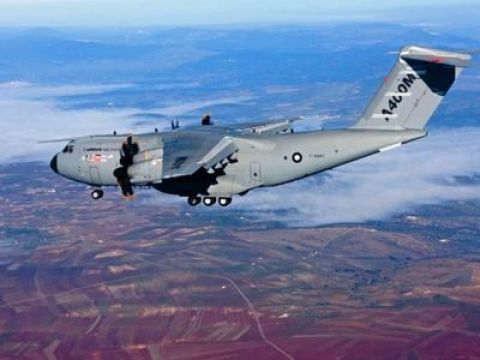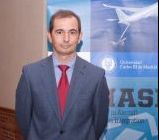MASI
A400M edging towards certification as engine problems resolve
November, 07th 2011 18:13
Two of the most significant technical problems affecting the Airbus Military A400M transport, involving the engines, have been addressed and fixes are in place, paving the way for type certification later this year.

The A400M’s Europrop International (EPI) TP400-D6 engine has been the cause of two major problems for the A400M project, but late last month EPI president Simon Henley said that the company is fixing the engine’s compressor blades to reduce wear after identifying unusual fatigue on the aircraft’s high pressure compressor blades.
EPI installed a temporary software fix for the high pressure compressor for the four test aircraft flying and is developing a full software fix that will be available for the next software release in the first quarter of 2012, the company said. The hardware upgrade would be available "early in the production run," EPI said. The first production engines are due to roll off the assembly line for the French Air Force later this year.
The engine’s second problem, involving a fatigue crack in the idler gear that caused an in-flight shutdown earlier this year (and that also caused the A400M to desist from flying at the Paris air show) has been isolated and a redesign implemented.
Meanwhile, it has been reported that engine performance is ahead of specification, with the current engines showing 1% better than targeted fuel economy.
Airbus is pushing to get the A400M certified later this year but type certification will most likely be achieved early next year. The TP400 engine gained EASA certification in May and has around 11 600 operating hours.
The TP400 engine is a source of contention between the French government and Airbus Military. "We still have not received a satisfactory proposal from Airbus, notably for the engine," French defence procurement chief Laurent Collet-Billon told the National Assembly's defence committee on October 5. "I have told industry that, without a service contract, I won't accept the aircraft and I won't pay for them."
France wanted to sign a common A400M support contract with Britain, but as deliveries to the French Air Force were due earlier than those to the British Royal Air Force, it would be difficult to reach agreement in time, Collet-Billon said.
"Airbus Military is working to reach an agreement on the service contract," company spokeswoman Maggie Bergsma said.
The A400M is four years late, largely due to development problems with the engine, the largest turboprops built in the West, and the flight management system from Thales.
The target is to achieve an initial operating clearance by mid-2012, the standard agreed with the seven customer countries under a deal signed in April, which involved the governments injecting an extra 3.5 billion euros to partially cover cost overruns.
Up until now, the four test A400Ms have flown nearly 2,400 hours and 784 flights. Some 60 pilots have flown the aircraft, including British, French, German and Turkish, as well as staff of the civil and military certification agencies.
"We are advancing very quickly towards the end of certification testing," Airbus head of flight operations Fernando Alonso said at the company's flight test centre in Toulouse, France. "I cannot say if we will finish on 10 December or 10 January [2012]. We will finish as soon as we can."
More info: http://www.defenceweb.co.za/
EPI installed a temporary software fix for the high pressure compressor for the four test aircraft flying and is developing a full software fix that will be available for the next software release in the first quarter of 2012, the company said. The hardware upgrade would be available "early in the production run," EPI said. The first production engines are due to roll off the assembly line for the French Air Force later this year.
The engine’s second problem, involving a fatigue crack in the idler gear that caused an in-flight shutdown earlier this year (and that also caused the A400M to desist from flying at the Paris air show) has been isolated and a redesign implemented.
Meanwhile, it has been reported that engine performance is ahead of specification, with the current engines showing 1% better than targeted fuel economy.
Airbus is pushing to get the A400M certified later this year but type certification will most likely be achieved early next year. The TP400 engine gained EASA certification in May and has around 11 600 operating hours.
The TP400 engine is a source of contention between the French government and Airbus Military. "We still have not received a satisfactory proposal from Airbus, notably for the engine," French defence procurement chief Laurent Collet-Billon told the National Assembly's defence committee on October 5. "I have told industry that, without a service contract, I won't accept the aircraft and I won't pay for them."
France wanted to sign a common A400M support contract with Britain, but as deliveries to the French Air Force were due earlier than those to the British Royal Air Force, it would be difficult to reach agreement in time, Collet-Billon said.
"Airbus Military is working to reach an agreement on the service contract," company spokeswoman Maggie Bergsma said.
The A400M is four years late, largely due to development problems with the engine, the largest turboprops built in the West, and the flight management system from Thales.
The target is to achieve an initial operating clearance by mid-2012, the standard agreed with the seven customer countries under a deal signed in April, which involved the governments injecting an extra 3.5 billion euros to partially cover cost overruns.
Up until now, the four test A400Ms have flown nearly 2,400 hours and 784 flights. Some 60 pilots have flown the aircraft, including British, French, German and Turkish, as well as staff of the civil and military certification agencies.
"We are advancing very quickly towards the end of certification testing," Airbus head of flight operations Fernando Alonso said at the company's flight test centre in Toulouse, France. "I cannot say if we will finish on 10 December or 10 January [2012]. We will finish as soon as we can."
More info: http://www.defenceweb.co.za/















